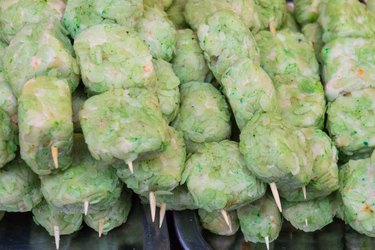
Bamboo rice is a type of rice popular in Asia, and it is made by infusing the grains with juice squeezed from bamboo plants. This action gives bamboo rice its distinctive green color and also adds a sticky consistency, so you might find bamboo rice to be a good choice for making sushi. Bamboo rice, as with other types of rice, is rich in carbohydrates and relatively calorie-dense.
Calories
Video of the Day
Bamboo rice is relatively calorie-dense, as a cup of the rice provides 160 calories, or 8 percent of the daily suggested intake of 2,000. If you're dieting, you can burn off bamboo rice relatively quickly through activity. For example, a 16-minute jog or 13 minutes of jumping rope can be sufficient to burn off 160 calories.
Video of the Day
Carbohydrates
Carbohydrates are the primary calorie source in bamboo rice. Each cup of this type of rice contains 34 g of carbs, which is 9 g more than a cup of oatmeal provides. High-carb foods can be useful for fueling athletic activity, as carbs provide your body with energy.
Fiber
Bamboo rice is not a rich source of one vital type of carbohydrate -- dietary fiber. Each cup of this product contains only 1 g of fiber. You need fiber to maintain the health of your digestive system, aid in providing feelings of fullness and to keep your blood sugar levels stable.
Protein
Bamboo rice, as with other types of rice, is low in protein. Each cup contains only 3 g of protein, which is half of what an egg provides. You need protein to build and repair your body's cells and tissues.
Fat
Bamboo rice does not contain any fat. This can be beneficial if you're dieting, as fat is calorie-dense, but fat does provide energy and helps your body absorb vitamins.
- MyFitnessPal: Calories in the Art of Spice Bamboo Rice
- Mayo Clinic; "Exercise for Weight Loss: Calories Burned in 1 Hour"; December 2009
- LIVESTRONG.COM MyPlate: Calories in Oatmeal (Publix)
- Colorado State University Extension; "Dietary Fiber"; J. Anderson et al.; December 2010
- LIVESTRONG.COM MyPlate: Calories in Egg
- MedlinePlus Medical Encyclopedia; "Dietary Fats Explained"; October 2010